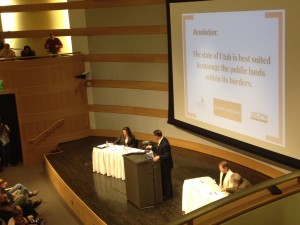SALT LAKE CITY — The Salt Lake Tribune sponsored a debate at the Salt Lake City Public Library on May 14 discussing the transfer of public lands to the state government.

Teams debated Utah managing public lands within its borders, with proponents arguing that federal management increases wildfire damage, while opponents doubt Utah’s readiness to handle management.
The debate featured two teams of two members, arguing for or against the resolution that the state of Utah is best suited to manage the public lands within its borders.
The debate started with an unscientific texting vote to gauge the views of the audience. About 39 percent of the audience agreed with the resolution that Utah is best suited to manage its own public lands. The same vote happened at the end of the debate, with 336 people responding. The audience sided against the resolution by an eight-point margin.
Proponents began the debate, describing how fire danger is a major problem in federally managed lands. Speaker of the House Rebecca Lockhart, R-Provo, who is often critiqued for some of her anti-government control views, told the audience about her father, who was a dedicated federal employee for several decades.
“Lack of federal planning has led us to management by emergency,” Lockhart said. “We’ve proven we can manage what we have now.”
Ken Ivory, R-West Jordan, told the standing-room-only auditorium he believes the states are ready and capable of managing public lands within their borders.
“It is up to Westerners,” Ivory said.
The opponents argued that change so drastic is not that simple. Dan McCool, a political scientist from the University of Utah, called for rational thinking and compromise when dealing with the issue.
“Change is not like a light switch. The Recreation and Public Purpose Act lets states assume ownership of public lands, but it is done in a rational way,” McCool said.
Pat Shea, former director of the Bureau of Land Management, agreed with McCool. He described what he called three myths when people discuss public lands ownership. One of these is the idea that Utah needs to get the land back.
“People say we’ve got to get the land back. That’s a myth. It has always been federal land,” Shea said.
This issue has always been controversial, but the issue has heated up in the past few months. Last week, dozens of Utahns illegally rode into Recapture Canyon on ATVs to protest the area being closed to ATVs due to fragile ancient cliff dwellings and native burial places.
McCool ended his argument by invoking the memory of Brigham Young.
“Brigham Young was one of the first environmentalists in the state,” McCool said. “It’s that kind of vision we need for our future.”
Although no resolution was made at the debate, both sides agreed that having public debates are a great way to keep the public informed about both sides of the argument.




